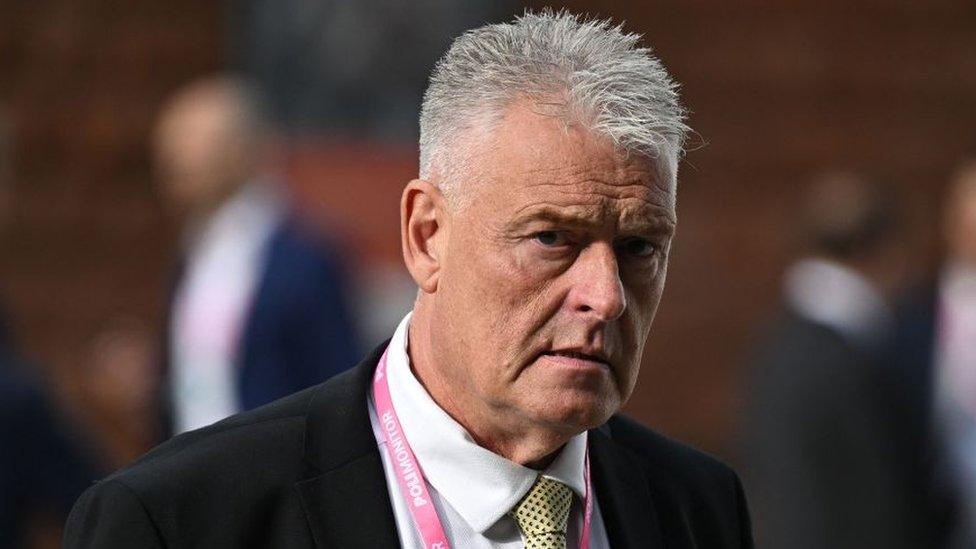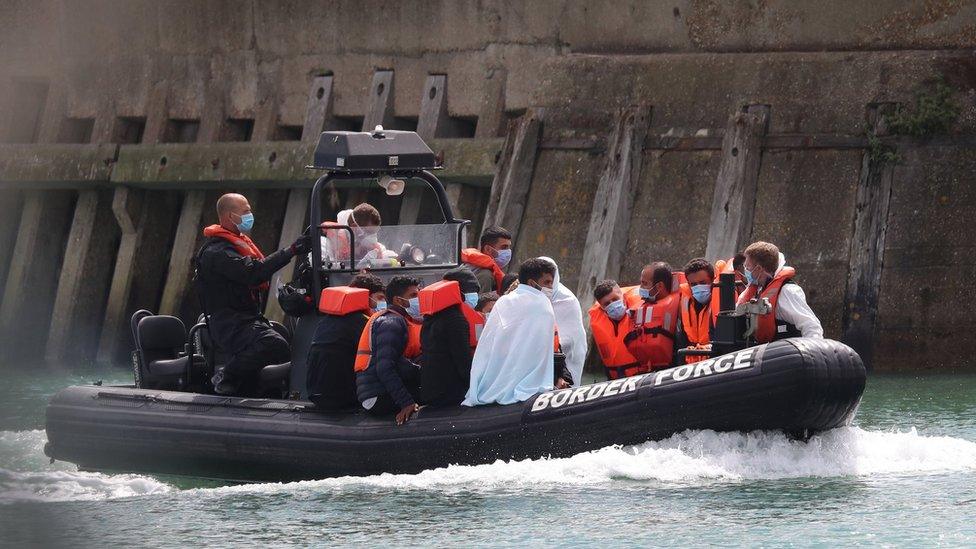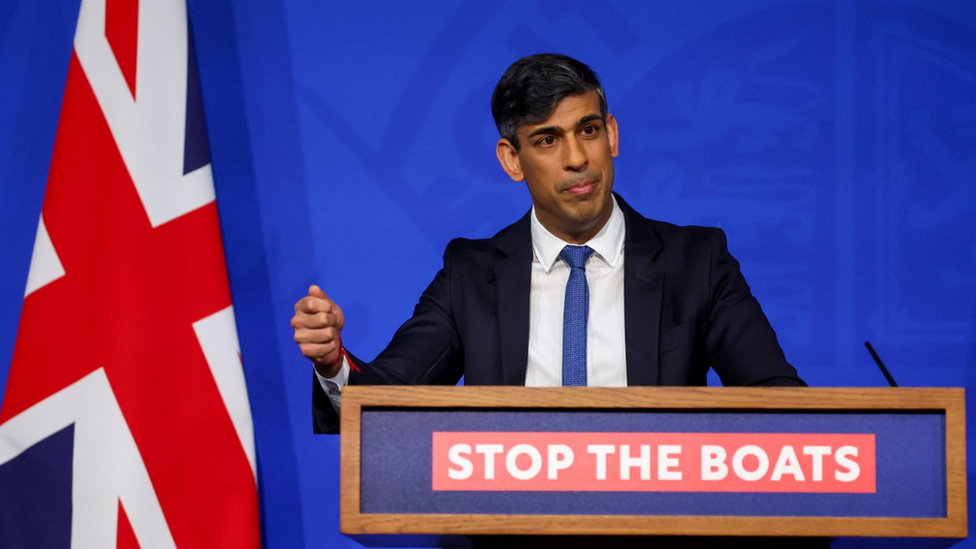Lee Anderson resigns as deputy Tory chair to rebel over Rwanda bill
- Published

Lee Anderson is the Conservative MP for Ashfield, in Nottinghamshire
Two Tory Party deputy chairmen and a ministerial aide have resigned to rebel against Rishi Sunak's Rwanda bill.
Deputy chairs Lee Anderson and Brendan Clarke-Smith quit to join about 60 Tory MPs backing an amendment rebels said toughened the immigration legislation.
Despite Mr Sunak suffering his biggest rebellion since becoming PM, No 10 is still confident the bill as a whole will pass in a vote due on Wednesday.
If some 30 Tories joined the opposition in voting down the bill, it could fail.
The legislation seeks to revive the government's plan to send some asylum seekers to Rwanda and deter people from crossing the Channel in small boats.
At least four Conservative MPs - including former ministers Robert Jenrick and Suella Braverman - have publicly said they are prepared to vote against the bill if it is not improved, with reports that more could join them.
The BBC understands the government could be preparing to offer a concession that would see official guidelines changed to introduce a presumption that rulings from the European Court of Human Rights blocking deportations could be ignored.
However, even a government victory would come at a political cost, with debates over the issue exposing the extent of divisions within the Conservative Party.
As well as the two deputy party chairmen, Jane Stevenson, a parliamentary private secretary in the Department for Business and Trade, also confirmed she had offered her resignation after voting for the rebel amendments.
In a joint resignation letter, Mr Anderson and Mr Clarke-Smith said they had previously argued that "safeguards" were needed to ensure the legislation was "watertight".
"It is therefore important in terms of credibility that we are consistent with this," they added.
The Tory MPs said they had supported rebel amendments to the Rwanda bill "not because we are against the legislation, but because like everyone else we want it to work".
Mr Anderson told GB News that while most of the bill was "sound", it needed "beefing up".
"I can't be in a position to vote for something which I don't believe in," he added.
Asked if he would vote against the bill as a whole on Wednesday, he said: "We'll see what happens over the next 24 hours.
"There's a lot of discussions going to happen behind closed doors."
'Toughest legislation'
Mr Anderson and Mr Clarke-Smith both represent so-called "red wall" seats previously held by Labour and have been outspoken on the need to tackle illegal immigration.
With strong support from the right of the party, there had been speculation the prime minister would choose not to sack them as they held party, not government, positions.
But in their letter, they acknowledged their "important roles" meant they were bound by collective responsibility - so are expected to vote with the government or resign.
Labour said the resignations showed Mr Sunak was "too weak to lead his party and too weak to lead the country".
"These resignations show that even senior Tories think that the Conservatives have failed and is yet more evidence of the total Tory chaos over their failing Rwanda gimmick - yet they are still making the taxpayer pay the extortionate price," the party's national campaign coordinator, Pat McFadden, said.
A Downing Street source said: "This is the toughest legislation ever brought before Parliament to tackle illegal migration.
"This bill will make it clear that if you come here illegally, you will not be able to stay.
"We must pass this bill to deliver what all Conservatives want - a credible plan to stop the boats."

Robert Jenrick has led efforts by right-wing Tories to rewrite the Rwanda bill
Amendments tabled by Robert Jenrick - who resigned as immigration minister last year over the Rwanda legislation - and veteran Conservative Sir Bill Cash were among those voted on by MPs.
Sir Bill's proposal, which aimed to prevent any international law being used to block someone being removed to Rwanda, was defeated by 529 votes to 68.
Senior Tories including former Home Secretary Mrs Braverman, former Prime Minister Liz Truss and former party leader Sir Iain Duncan Smith were among those voting in favour.
Former Cabinet minister Sir Simon Clarke said he would vote against the legislation if it was not amended - declaring it to be as "simple as that."
Miriam Cates, co-chair of the New Conservatives coalition of Tory MPs, told the BBC she would "potentially be prepared" to vote against the bill, as she urged the government to "tighten" it before any vote on Wednesday.
European Research Group chairman Mark Francois and Danny Kruger, also co-chair of the New Conservatives, also declined to rule out voting against.
But speaking on Sky News, the former first secretary of state Damian Green, a member of the One Nation caucus of moderate Tories, urged colleagues to back the legislation on Wednesday.
He said Tuesday's show of defiance was "the high watermark" of the rebellion, and said the "rational" approach would be to support legislation "that moves the dial in the direction they want it moved in".
Meanwhile, Mr Jenrick's amendment was also defeated, by 525 votes to 58.
Under his proposal, people could still appeal their removal to Rwanda, but only after they had been deported.
- Published16 January 2024

- Published13 June 2024

- Published16 January 2024